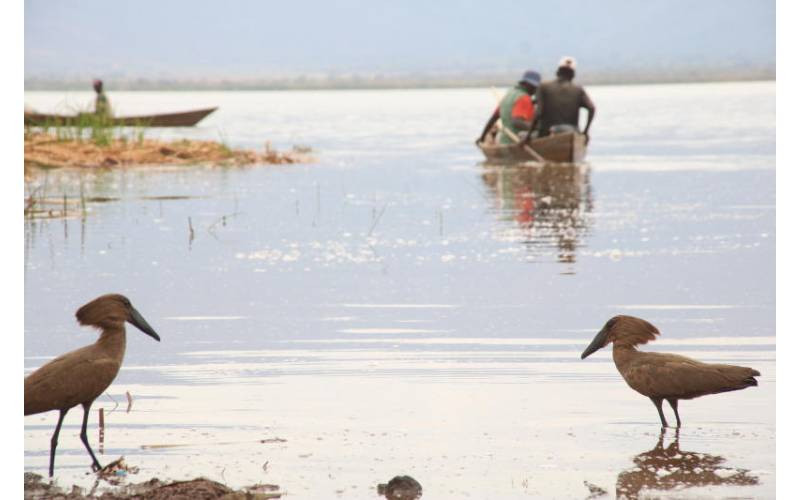
Birds wait for fishermen to feed them with fish at Lake Jipe in lake jipe conservancy in Taita taveta county [David Gichuru,Standard]
Kenya's national parks and reserves are world famous and attract many visitors. Lesser known but just as diverse and enchanting are the conservancies found all over the country.
This time I headed south from Nairobi, the destination? Mgeno, Kasigau, and Lake Jipe Conservancies. These three form part of the 33 Taita Taveta Wildlife Conservancies (TTWCA).
My preferred mode of transport is SGR's Madaraka Express. It is ideal in matters of safety, pocket-friendly fare and shortens travel time by more than two hours, compared to going by road.
I disembark at the SGR Voi Station and take a tuktuk to Tsavo Voi Lodge, ten minutes away. The lodge is a stone's throw away from the Voi Gate entry to Tsavo National Park.
My base is the steadily growing town of Voi, historically synonymous with the Man-eaters of Tsavo.
INTO THE WILD
The next morning, a Monday, I woke up to a beautiful sunrise. During breakfast, I learn from James Mwangi of Boma Simba Lodge, and my host, that conservancies are key to wildlife conservation. They host more than over 65 per cent of Kenya's wildlife found outside protected areas.
After breakfast, I am set for my Safari to Mgeno Conservancy in Mwatate.
After a 10-minute drive from the lodge, we join the Voi-Nairobi highway and after another five minutes, we take the detour to the Voi-Mwatate highway, driving past past vast sisal plantations.
We stop at a strategically elevated spot, and from here, one can see the expansive Mgeno Conservancy and beyond. The 360 degrees view stretches across the 37 former ranches that dot the landscape of Taita Taveta County.
Mgeno covers an area of 53,000 acres at the foothills of the towering iconic Sagall Hill.
BORN IN HISTORY
The wildlife conservancy is rich in bird species and is fast growing to be a vital bird watchers' heaven. It has recorded over 200 species of birds, including migrant endemic and endangered birds.
Day two found me at Kasigau Conservancy, which has also recently been elevated from a ranch to a conservancy.
It comprises six villages that make the conservancy a melting mix of cultures, while the towering hills are the perfect background to beautiful sceneries.
But amid this beauty is a history wrought with bitterness.
Locals tells the story of the colonial deportation of the Wakasigau to Malindi by the British Army during the First World War. The community was accused of aiding Germans from Tanganyika (present-day Tanzania), to raid a British military camp based in Kasigau.
British troops turned on Kasigau residents, angry at suffering suffer heavy casualties after being ambushed by the Germans. Their Chief Mwangojilo and other leaders resisting the eviction were killed.
The Wakasigau were then forced to walk on foot from Kasigau to Maungu without food and water. From there they were loaded into a cargo train to Mombasa and thereafter onto a waiting ship to Malindi.
WILDLIFE CORRIDOR
Reportedly, the community spent about 22 years away from Kasigau. After years of suffering in concentration camps, the community found their way to Mwatate, their second relocation, which is near Kasigau.
The community's elders kept communicating and pleading with the local authorities to be allowed to return home to Kasigau. They were eventually allowed to come back to Kasigau in 1936 to rebuild their homes.
Tabitha Ndombolo, a warden at Kasigau, explains that the conservancy sits on one of Kenya's most important elephant movement corridors, and therefore keeping the land intact and functioning for wildlife, livestock, and rich vegetation is critical to the success of the conservancy. The wildlife corridor connects the Greater Tsavo East and Tsavo West National Parks to the Mkomanzi Reserve of Tanzania.
Lake Jipe
The showstopper of my adventurous experience was a drive to Lake Jipe Conservancy, home to the Grogan Castle. Although in its infancy, the 1,400-acre conservancy, offers visitors a day or a night game viewing of wildlife in the area either from the castle or on a game drive.
Lake Jipe Conservancy is home to animals like gazelles, giraffes, zebras, dik-dik, elephants and buffalos, which I had the pleasure to watch at a watering hole against the background of a magnificent sunset.
A visit to Lake Jipe, a shallow inter-territorial lake straddling the borders of Kenya and Tanzania. On the Kenyan side, it is located south of the village of Nghonji, while on the Tanzanian side it is situated within Mwanga, in the Kilimanjaro region. Boats from the Tanzanian side bring fish to sell on the Kenyan side go back with goods. Residents here fearlessly go about the business despite the warning that Lake Jipe is a crocodile and hippo-infested lake.
"From a tourism perspective, conservancies have for a long time been often recognised as secondary places to visit. This is notwithstanding the huge potential of conservancies acting as viable areas for spreading the tourism footprints, reducing congestion, and providing new opportunities for new tourism investments," says Mwangi.
 The Standard Group Plc is a multi-media organization with investments in media
platforms spanning newspaper print
operations, television, radio broadcasting, digital and online services. The
Standard Group is recognized as a
leading multi-media house in Kenya with a key influence in matters of national and
international interest.
The Standard Group Plc is a multi-media organization with investments in media
platforms spanning newspaper print
operations, television, radio broadcasting, digital and online services. The
Standard Group is recognized as a
leading multi-media house in Kenya with a key influence in matters of national and
international interest.
